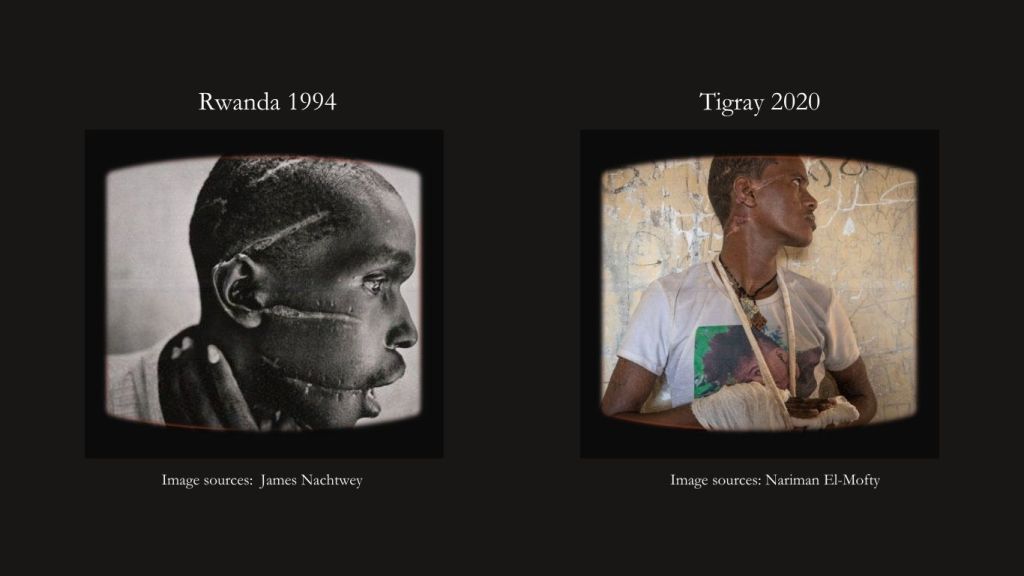Tigray Disaster Relief Fund (TDRF) observes April 7th, as the annual International Day of Reflection on the 1994 Genocide Against the Tutsi in Rwanda, a somber occasion to commemorate the tragic events that unfolded 30 years ago, claiming the lives of nearly one million people, and to honor the resilience of those who survived.
The Rwandan genocide serves as a stark reminder of the consequences of hate, intolerance, and the international community’s inability to aid survivors during and immediately after such conflicts occur. The echoes of past atrocities resonate in the suffering of the people of Tigray and underscore the importance of recognizing and addressing the root causes of armed conflict and violence.

Rwanda Context
Despite the Hutu tribe comprising 80% of Rwanda’s population, the Tutsi minority historically held power during decades of colonial rule, exacerbating social divisions even beyond Rwanda’s independence. The assassination of President Juvenal Habyarimana in 1994 served as a catalyst to the armed conflict, igniting long-standing resentments and suspicions against the Tutsi.
Hutu extremists, convinced of Tutsi involvement, seized upon this event to initiate a systematic campaign of extermination. State sponsored propaganda campaigns demonized the Tutsi community, portraying them as enemies of the state. This toxic environment, combined with political instability and the failure of the international community to report and respond to the turmoil, created a fertile ground for the systematic slaughter of innocent lives.
Fast forward 30 years later, we honor the memory of the victims in Rwanda and vow to never forget their suffering. However, even as we remember the past, we must also confront the present reality of violence and mass atrocities still permeating on a collective scale. In the Tigray region of northern Ethiopia, a conflict has been raging since 2020, resulting in widespread human rights abuses, including reports of war crimes, sexual violence, and widespread ethnic cleansing.
Tigray Context
Tigrayans have experienced persecution primarily due to political tensions and power struggles for decades within Ethiopia. The conflict escalated in November 2020 when the Ethiopian and Eritrean military forces, along with their allies, launched a brutal military offensive against the Tigray People’s Liberation Front (TPLF), the ruling party in Tigray, following a series of clashes and disagreements over political representation. It reached a head when the Ethiopian government accused the TPLF of attacking a federal military base, leading to a violent crackdown in Tigray.
Like the situation Rwanda, the persecution of Tigrayans involves ethnic dimensions, with the Tigrayan ethnic group being targeted by Ethiopian and Eritrean government forces across the country. Over two years, the War on Tigray has claimed over 600,000 civilians and displaced millions, in a small region comprising of only 6 million people and becoming one of the deadliest conflicts of the 21st century.
Just as the international community struggled to intervene effectively during the Rwandan genocide, the response to the crisis in Tigray has been marked by hesitancy and bureaucracy. Despite clear evidence of atrocities, the global response has been slow and inadequate.
The situation in Tigray remains dire, with reports of continued violence and humanitarian crises. More than half the region’s population is experiencing widespread hunger after years of living under siege, and millions are displaced after the illegal annexation and ethnic cleaning of Western Tigray. Accountability remains to be seen, while the survivors of the Tigray Genocide remain without justice.
As we mark the 30th anniversary of the genocide in Rwanda, we must acknowledge the persisting patterns of cruel violence and state-sanctioned persecution that continue to expose the troubling depths of our shared conscience. TDRF continues to reaffirm its commitment to justice, accountability, and the prevention of mass atrocities–wherever they may occur. We must heed the lessons of history and stand in solidarity with the victims of genocide, both past and present. It is only through collective action and our common commitment to peace and justice that we can build a more just world for future generations.